A quick look at the Alexa traffic rank graphs of WordPress.org, WordPress.com and other popular WordPress websites could easily give you the impression that traffic is dropping and WordPress is in decline.
WordPress.org
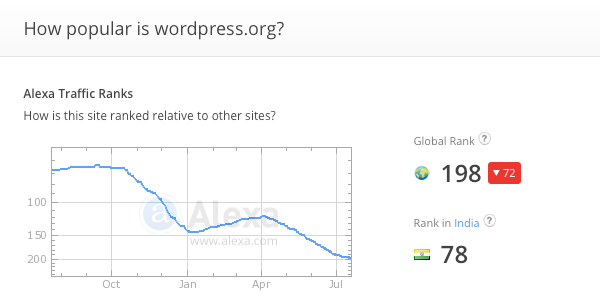
WordPress.com
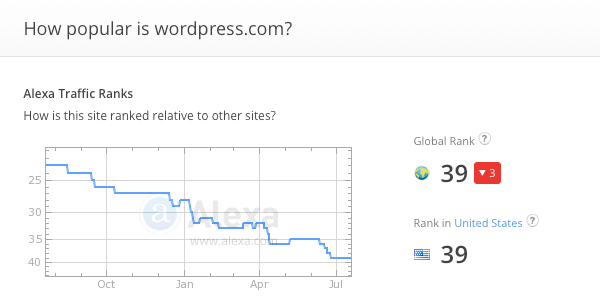
The Alexa graph for the last year doesn’t look positive, so is WordPress really in decline?
We reported last week that many authors on ThemeForest have experienced a massive decline in theme sales (50-70% drop) over the last couple of months. Some independent WordPress theme shops have reported their sales are dropping also. Speculating about the reasons for such a drastic decline some people have pointed to the Alexa rankings and blamed the drop in sales on decreasing traffic levels.
Lets have a look at the Alexa Traffic Rank graphs for ThemeForest and some other popular WordPress shops and blogs. It’s interesting to see that all these sites share a similar pattern in their traffic rank chart, and all are in decline.
ThemeForest
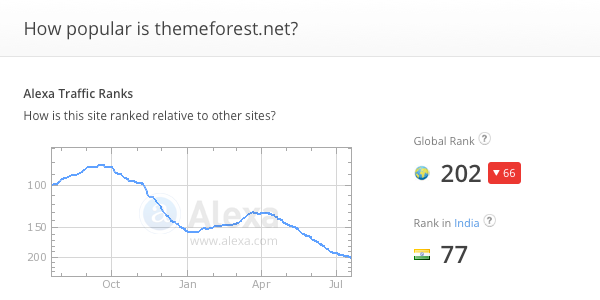
StudioPress
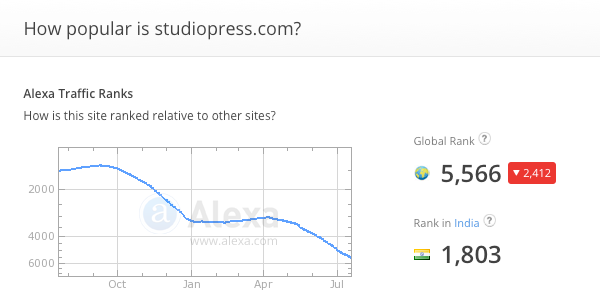
WooThemes
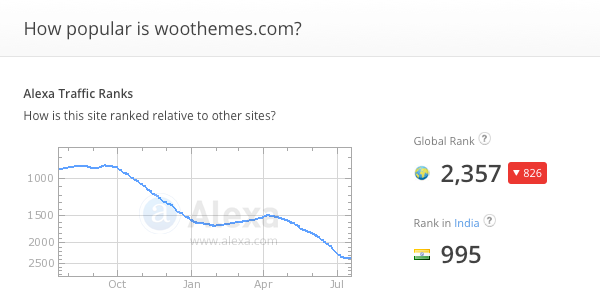
Elegant Themes
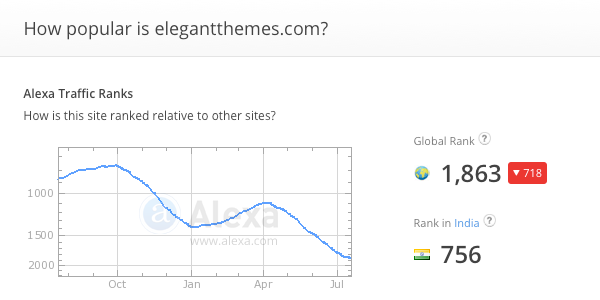
Mojo Themes
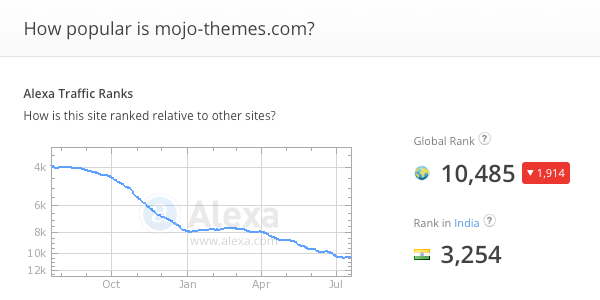
WPTavern
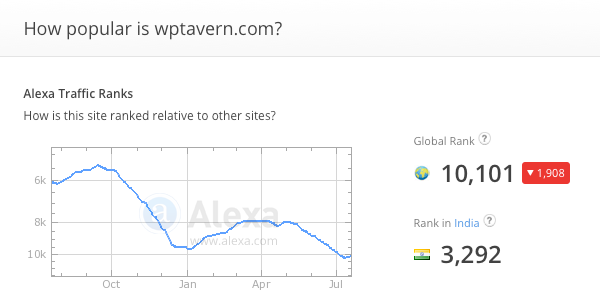
WPBeginner
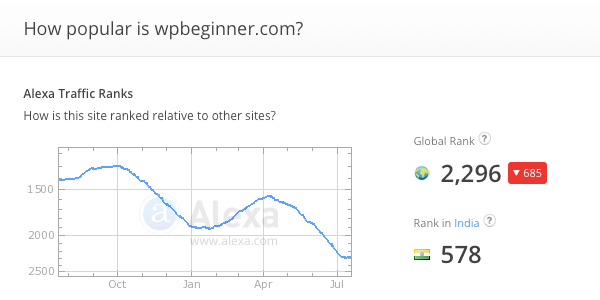
WPMU DEV
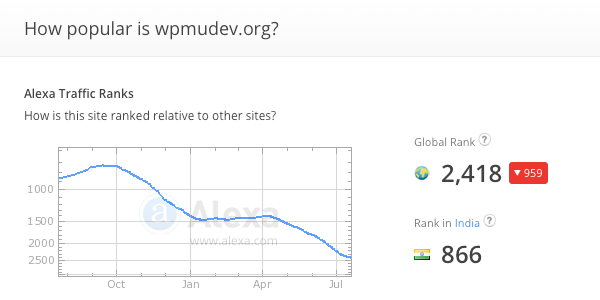
So what’s going on here? Is WordPress traffic and popularity really in decline?
It’s important to understand what the Alexa Traffic Rank actually is and how’s its measured.
As explained on the Alexa website, “the Alexa Traffic Rank is an estimate of a sites popularity. The rank is calculated using a combination of average daily visitors to the site and pageviews on the site over the past 3 months. The site with the highest combination of visitors and pageviews is ranked #1”
So how does Alexa measure the traffic and pageviews for a website?
Alexa’s traffic estimates and ranks are based on the browsing behavior of millions of people in their global data panel, which is a sample of all internet users. This data is collected from a large and diverse set of 25,000+ different browser extensions and plug-ins. They also gather data from direct sources including the Alexa toolbar and sites that have chosen to install the Alexa script and certify their metrics.
That sounds like the Alexa Rank should be a fairly accurate indicator of a sites traffic and popularity. So what’s going on with the rankings of WordPress sites?
The key thing to remember with the Alexa traffic rankings is that it’s relative to other websites. “The Alexa Traffic Rank of a given website isn’t only based on traffic to the given site, but takes into account the traffic to all sites and ranks sites relative to each other. Since your site is ranked relative to other sites, changes in traffic to other sites affect your site’s rank.”
So as crazy as it may seem at first, it’s quite possible that a website’s Alexa ranking can decline even when the amount of traffic to the website is stable or even increasing! Is that what’s happening with WordPress sites?
According to all reports WordPress is still growing strongly, and it doesn’t appear WordPress is loosing popularity as a web publishing platform. WordPress is currently used on 24.2% of websites worldwide, and is on track to reach 25% before the end of year. BuiltWith, the popular service dedicated to monitoring internet technology trends and usage, in their report on CMS usage from January to July 2015 showed that 48% of total CMS’s tracked are WordPress and that WordPress had been added to 1.1 million domains since January accounting for a 7% increase in customer base.
So why is the Alexa traffic ranking in decline for WordPress.com, WordPress.org and many other WordPress related websites?
Could it simply be the effect of the relative factor of Alexa’s ranking algorithm – in that there’s an ever increasing number of websites, and other websites are experiencing a greater increase in traffic and popularity thus causing the Alexa ranks of WordPress related websites to decline as a result?
Or is it something else entirely? Has Alexa changed the way they collect their data? Is it a seasonal pattern? Or is interest in WordPress plateauing or even declining?
Let us know what you think in the comments below.
I believe that while WordPress is still growing strongly, it is nevertheless declining in overall popularity amongst an increasing growth in total websites.
I’ve been watching this trend for some time, using another method based on Google Trends, at http://buzztone.com.au/wordpress-google-trends/. After a major spike in interest around the time of the last Soccer World Cup, WordPress has been showing a gradual but significant decline.
@ Neil, thanks for the comment. I think you’re spot on there.
Good point about Alexa rankings being relative. In line with your point, our rank for churchthemes.com has declined while our traffic has increased.
@ Steve thanks for sharing whats happened with churchthemes.com
I believe a lot of the WordPress growth is coming from non-techie people that don’t always get tracked by Alexa. Because Alexa toolbar is an important part of the equation and much more commonly installed by tech peoples, sites that are in that arena artificially rank higher (eg SEO sites, git sites, etc).
More and more WordPress sites are being built by WordPress professionals. Our experience says folks who build WP sites professionally typically don’t use WordPress.com, they use paid hosts like WP-Engine, GoDaddy, etc. WordPress professionals also don’t need to use resources like WordPress.org as much as novice builders do. We continue to see strong growth in demand for WordPress sites. This week we were contacted by two relatively small digital marketing agencies (under 10 employees) in the US who need to outsource development because they both had over 25 websites in their pipelines right now. Another agency contacted us recently because they lost their second WP developer in twelve months to a higher paying job with a bigger WordPress-only agency. We are also seeing a resurgence in requests for “convert this non-WordPress static site to WordPress and make it fully responsive” projects.
Are you saying that the decrease in traffic rank displayed inaccurately in alexa is causing advertisers rethink twice ? You have mentioned themeforest sales is down.. These are summer holidays and its supposed to be like that. I Think.
From a user perspective WordPress is still the best CMS of all time. If no other software will hit the market that’s even more powerful and flexible, then I think it’s safe to predict that WordPress will get even more popular. In my opinion it’s often more powerful to think in simple terms about something than analyzing lots of different metrics and data. But the article was still interesting to read. I didn’t know where Alexa’s data is coming from. Thanks!
I totally agree with allie. Alexa traffic ranking isn’t accurate. And even if WordPress sale temporarily decreased, I don’t think this is really alarming. There isn’t any other better alternatives of WordPress.
WordPress is a fad that should go away
it’s easy for non-professionals to get a handle on WordPress because it doesn’t require much knowledge, but the quality of websites built with it is not very good.
I think of WordPress as an excellent CMS, like for personal blogs and such, but for professional websites where performance and reliability come first, it’s not a good fit.
I found this article after I noticed a declining trend for WordPress and Googling to find out why. It’s interesting to read this with the benefit of some time since it was posted.
To summarize: there is a drop in interest for WP and, although it’s unclear why, it may be attributed to its maturity as a product, its easier learning curve in the beginnng, and the fact that it’s an entry point to other more complex platforms.
If you look at Indeed Trends AND Google Trends, both show a decline in WordPress usage since a peak between July 2014 to March 2015, and it has been trending downward ever since. This corresponds with the release of version 4 and, if you look at data from w3techs.com, you see that not as many people made the switch to version 4 as with version 3. The data suggests that fewer people are interested in WordPress as demonstrated by searches and fewer jobs offered for it.
Of course, WordPress is still the market leader, and the raw number of WordPress sites continue to grow. But raw numbers usually go up as the number of websites increase over time. As Neil stated above, WP “is nevertheless declining in overall popularity amongst an increasing growth in total websites.” As WP powers a quarter of all websites, it has wiggle room; but if WP doesn’t reverse course, it may be easy to conclude that it’s a dying fad, as Alex stated above.
In general, there is an overarching decline in relative interest for the existing content management systems (CMS). The LAMP stack has more competition today than before. You now have the MEAN stack. For the past few years, Node.JS has been on the rise. It doesn’t mean (no pun intended) that LAMP is dying, it just means that there are more tools available depending on your use case. PHP has seen a slight decline but it still is in use on 82.2% of all websites. There are also a lot of applications being built for mobile devices. As for the CMS, many who don’t need all the functionality or see it as bloated software, are switching away to less cumbersome solutions, such as static site generators. Others, with smaller budgets, find it sufficient to use site builders like Wix, Weebly, or SquareSpace. With CMSs being around for over a decade, they are not the “hot” tool that they once were. But while people are often quick to declare something dead–the Web, keyboard, and Facebook have all been declared dead at some point before and all still have the same level of prominence–CMSs are here to stay, for now.
These changes, however, directly challenge WordPress’s market position. While WordPress’s installation base continues to grow, the drop in interest in it relative to other technologies does seem to indicate something else. Its decline is only better than that of Joomla’s. From 2006 to 2009, Joomla was the hottest CMS. After a serious makeover of WordPress to make it more user friendly, WordPress took away much of the Joomla user base. The two were both appealing to the lowest common denominators, either the simpler projects or the people with less technical skills. However, as these products naturally mature, in order to accommodate more complexity, their learning curve continues to go up.
Of course, neither Joomla nor WordPress started off appealing to developers intent on using it as a framework and so it has been mostly after-the-fact retrofitting to make them do more than was originally intended. This happened to some degree in the Drupal community as well, but what’s kept Drupal going steady is that it has been more of a “framework” from the beginning. WordPress may be used by the most websites, but they’re primarily low-traffic sites. Drupal, on the other hand, has a far smaller user base but it is used by websites with the highest traffic. The first is appealing to people who need something quick and simple, or who have less technical skills, while Drupal is appealing to those who want the functionality or a framework that can be used to bootstrap an information system.
My theory is that as people start to realize they need more functionality, they are turning to platforms and technology stacks that were built to handle more sophisticated websites. Perhaps WordPress is losing a grip on what set it apart from the pack or perhaps the lesser degree of flexibility ultimately leads people to switch to a tool that’s designed to function as more of a framework instead.
In fact, BuiltWith.com also points out how WordPress is an “entry point”:
“In 2014, more than 8500 users moved away from WordPress, replacing the CMS with either Joomla or Drupal. Drupal also does well with users leaving Joomla!. Although there is some movement in both directions, in net terms more than 2000 websites have moved from Joomla! to Drupal over the last 4 years.”
https://blog.builtwith.com/2015/11/11/wordpress-vs-joomla-vs-drupal-the-battle-of-the-cms/
I see the decline happening because of a few different trends. Static websites with the dynamic bits wired in with a reactive JS framework are an undeniable trend. These static sites are pushed to the cloud and are automatically available on a global CDN. No clunky load-balancing and performance tuning. WordPress is simply not a first-class citizen of the cloud. With more developers increasing their JS proficiency, the trend away from bloated CMS’s will increase. Headless CMS systems are so much better. Decoupled content is a cleaner and smarter approach.